Overdoses, housing, service, more: Buncombe Commission hopefuls make their cases
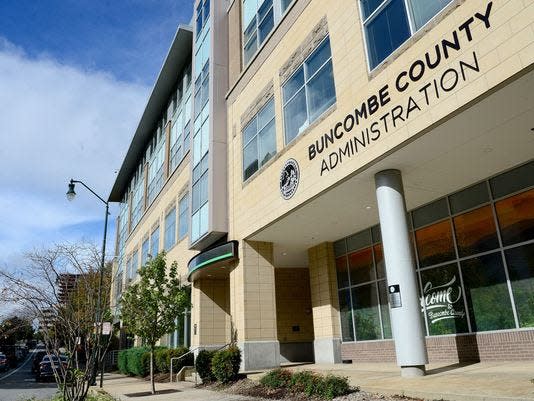
ASHEVILLE - Three Democrat and three Republican candidates will vie for Buncombe County Board of Commissioners seats on Nov. 8.
Three of them, Democrat Amanda Edwards, 45, Democrat Al Whitesides, 77, and the only Republican on the current board, Robert Pressley, 63, are running for reelection.
They face Republican Don Yelton, Republican Anthony Penland, 54, and Democrat Martin Moore, 34, respectively.
Whitesides already defeated opposing democrat Bill Branyon during the May 17 primary and is the only incumbent who already faced an opponent.
Responding to a general election questionnaire from the Citizen Times, most of the Board of Commissioner candidates tackled two of the issues facing Buncombe County today: housing and response to increasing overdose deaths.
Both have been recent topics of discussion in board meetings, as the county creates a spending strategy for $16 million in opioid settlement money over the coming 18 years and looks forward to another item on the Nov. 8 ballot this year, a bond referendum that includes $40 million in borrowing for affordable housing.
Only one candidate, Don Yelton, did not respond to the questionnaire.
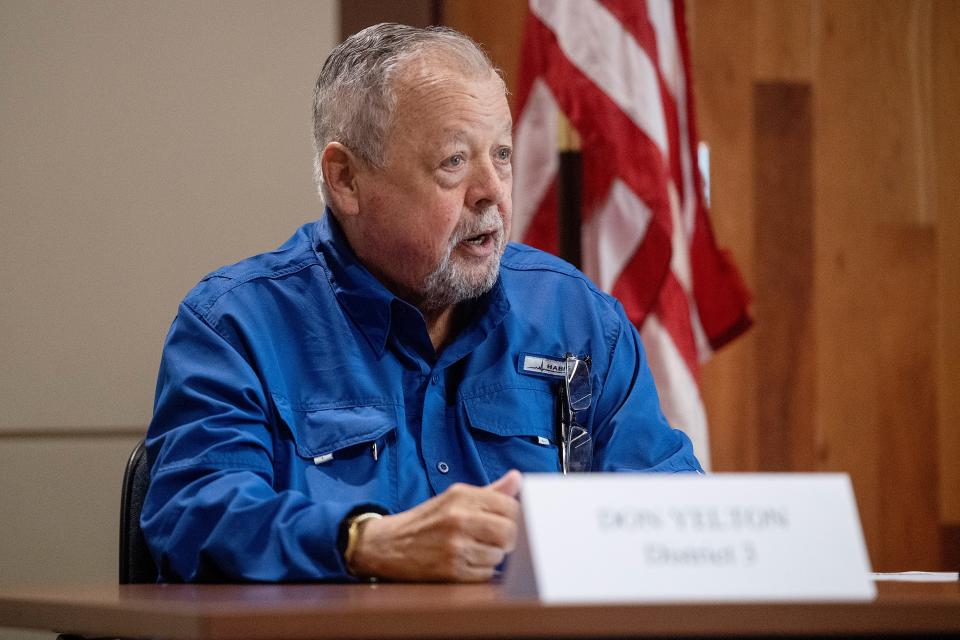
Please give a brief autobiography explaining your background (professional and/or personal) and what about it qualifies you to serve on Buncombe County Board of Commissioners.
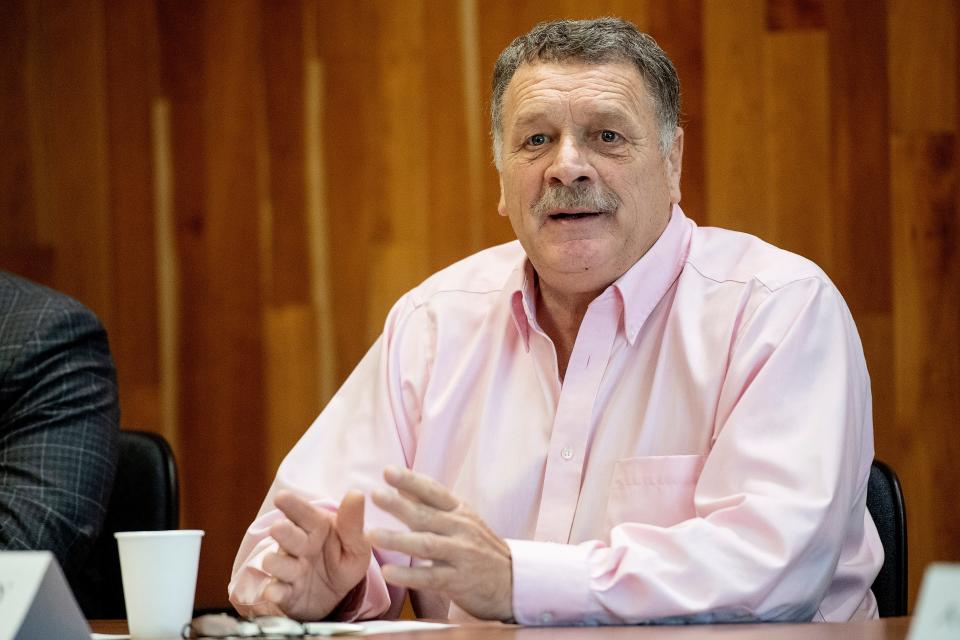
Pressley: I am a native of Buncombe County for 63 years. I’ve been self-employed for (more than) 30 years. I have signed the front of checks, not the back of checks. I understand budget understand spending using common sense on how our taxes dollar are spent.
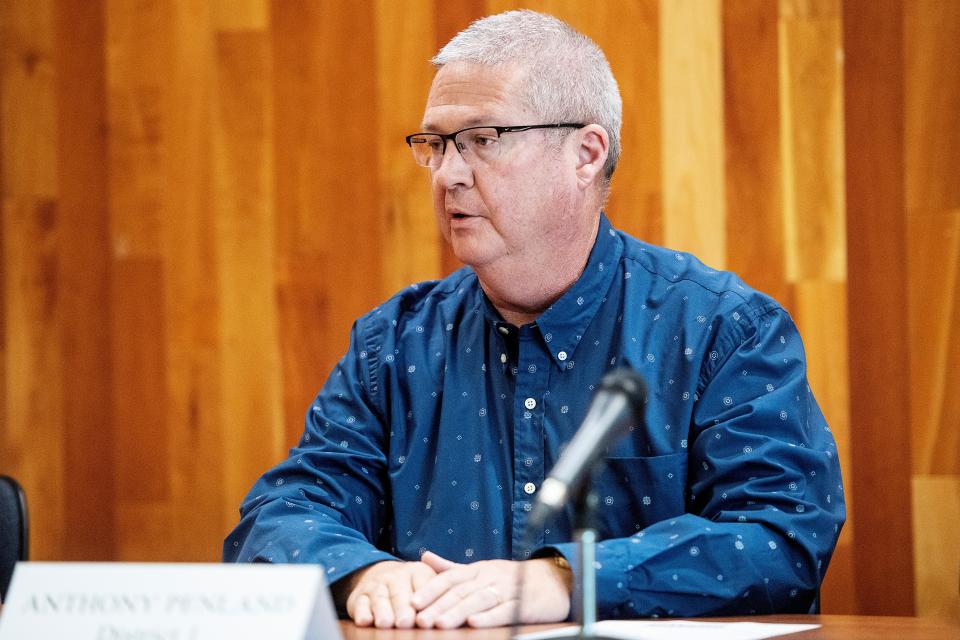
Penland: For 32 years of my life I have had the honor of serving this county as a public servant in the public safety sector as a member of the Swannanoa Fire Department. I am known as a tough budget watcher and I am a proven leader, having been given many opportunities throughout the region and state to be in leadership roles of fire service organizations. I will stay focused on the issues and will never assume anything from my position as a commissioner. Politicians seem to forget whom they serve: public servants do not.
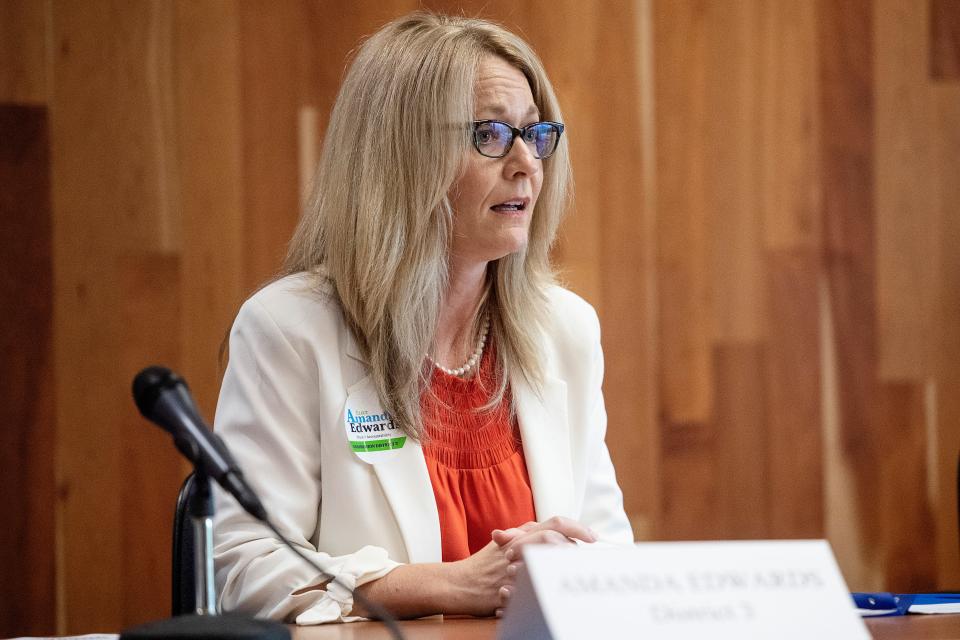
Edwards: I work every day to reduce poverty, increase opportunity and improve livability in our community. I led the Literacy Council and the WNC Red Cross. I now lead College Advancement at A-B Tech Community College. Basic skills, emergency services, and educational and career opportunities are vital needs that intersect with our efforts for higher wages, equity, and climate action. I have a degree in county management (Master of Public Administration) and am a lifelong learner and volunteer. I ask for your vote to achieve, protect and preserve more for all the people of Buncombe County today and in the future.
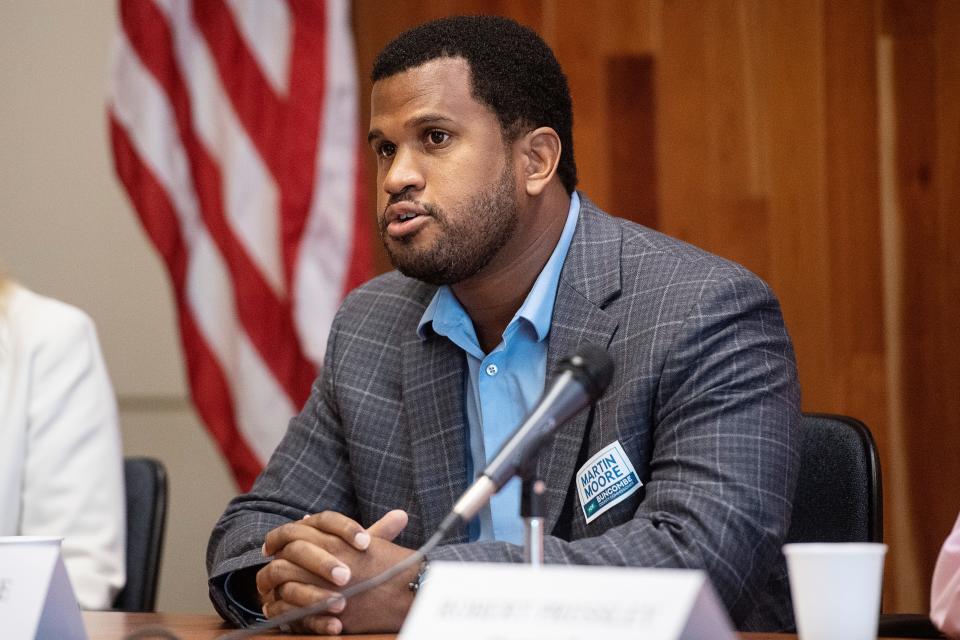
Moore: North Carolina became home for me years ago when I moved here to attend UNC Chapel Hill. During those years, I knew that public service and fighting for working class neighbors would be a key part of my career. As an attorney, I’ve spent years working with the underserved, counseling small business owners and working families, and working with non-profits to advocate for what my neighbors demand most: public safety solutions, properly funded schools and honest conversations about how we improve quality of life for Buncombe residents.
My experience working with families and folks from all walks of life is the qualification I believe matters the most. We need representatives who understand what their neighbors are going through. I’ve worked with farmers and small business owners; service workers and retirees. District 2 deserves to be represented by a commissioner who is connected and engaged with all of our community and will focus on solving problems. The neighbors I’m speaking with in Buncombe don’t want to hear us complain about the issues, they’re asking for solutions. I’ve built bridges and gained the experience it’s going to take to give District 2 a strong, effective voice on County Commission.
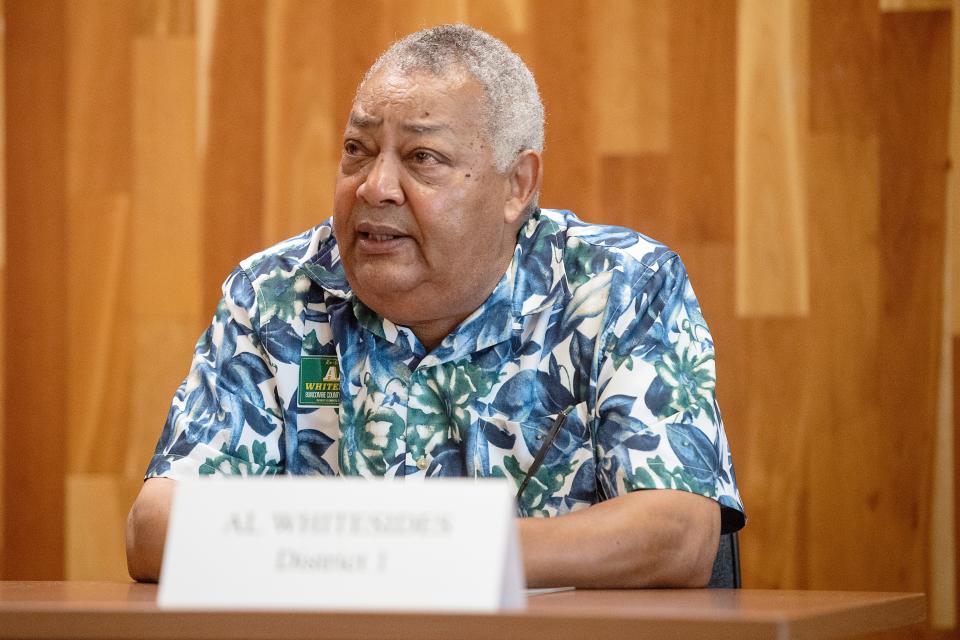
Whitesides: I was born in Asheville and graduated from Stephens-Lee High School in Asheville. I also graduated from North Carolina Central University in Durham. I worked for 40 years in banking in Buncombe County. I’ve worked on nonprofit boards since I was 15 years old in this community and I’m in my sixth year as a Buncombe County Commissioner. My 40 years banking experience and a lifetime of experiences working in our community allows me to bring a lot of experience and knowledge of county history to the commission.
Affordable housing continues to be a top policy and spending priority for Buncombe County Board of Commissioners. What are the most important, actionable steps the board can make or continue to make that will ensure an affordable and stable housing market for Buncombe through the coming decade?
Pressley: Buncombe County has a major problem with affordable housing but also we must look at the residents who lived here for many years who are being forced out of their homes because of the high taxes. Yes, look at affordable housing what we can do over the next decade, but also make sure we take care of our local residents (who have) been here for many years.
Penland: What was being considered affordable two years ago, is not the same number as it is today? We need a clear definition of what is affordable housing. We need to build relationships with our home builders, contractors, and we need to listen to them. They are a valuable resource as to the construction cost. We need programs that will take care of the elderly who cannot afford for the values of their homes to continue to rise. Is asking the citizens to pay more the right thing to do when addressing the affordability to live in this county?
Related:Affordable mobile homes are disappearing in Asheville; code change could bring some back
Edwards: The most important step we can take together is for each of us to vote yes on the affordable housing bond that is on every ballot in Buncombe County this fall. This bond is a game-changer. Steps I've taken as a Commissioner: advocated to put this bond on the ballot, created accountability measures for the bond (annual independent audit, a citizens oversight board, public review of all accounting), and set measurable goals: 2,165 new housing units — a mix of homeownership and rentals — and 500 repairs to keep long term lower-income residents in their affordable homes, all available by 2030.
Moore: The Comprehensive Plan is intended to incorporate some important community feedback that should guide our decision-making. If our community votes in favor of the housing bond, I would like to see those funds used creatively and responsibly. We need to be deliberate about funding initiatives for families and support long-term, sustainable housing that will accommodate the growing families of our working professionals. A portion of these funds should also be dedicated toward assisting our retirees with fixed incomes as they manage increased taxes. It’s critical that we address the cost-of-living concerns shared by both our working families and retirees.
Whitesides: Persuade the citizens of Buncombe County to vote to approve the $40 Million bond issue on Nov. 8. Develop land the county already owns for affordable housing. Encourage existing businesses and recruit new businesses that pay a living wage or higher with good benefits. Offer courses through local nonprofits and other organizations on how to be in a financial position to purchase a home. Work with the city of Asheville and other municipalities in the county to pool our resources and work together to solve this problem.
Research from the Sheriff's Office and the Register of Deeds recently found that 2021 was the worst year on record for overdose-related deaths. What are the most important, actionable steps the board can make or continue to make that will ensure overdose deaths rates go down in Buncombe through the coming decade?
Pressley: The data is correct: We have a major problem with overdoses, not only in Buncombe County but in our state. And it contributed a lot to the open border. We must continue to provide the right tools (to) our sheriff's office, not defunding law enforcement, and help ... our community to combat this opioid crisis. As ... commissioner(s), we can only provide funding; We need elected officials to be held accountable for the funding that they received.
Penland: As a public safety professional in Buncombe County, I have seen some of those deaths firsthand. It is heartbreaking to see when you know that help is there. We need to invest in our mental health and rehab programs. Working with those who are seeking help or have tried to seek help should give us an understanding of what programs are working and what is not. We need to invest in the resources needed and support our law enforcement officers who work in the drug units to stop the flow of drugs into our county.
Edwards: Fund, appreciate, and problem-solve with our emergency services staff and our community advocates on the front lines of our opioid crisis. I advocate for directing opioid settlement funds to emergency services. I support pay increases for our people who are providing life-saving and life-sustaining work. I lobbied to ensure the proposed County budget funds emergency services apprenticeships. Vote for state-level candidates who will expand Medicaid — approximately 600,000 North Carolinians would then have access to health care, including mental health and substance use services. Vote for U.S. Senate and House candidates who support healthcare, including mental healthcare, as a human right.
Buncombe:After Buncombe's deadliest recorded year for overdose deaths, settlement spending starts
Moore: I’ve worked in Buncombe’s court system for years and know that our community paramedics and deputies must be properly equipped and funded to do what they do best: save lives. In the long-term, we should use a significant portion of our opioid settlement funds to invest in evidence-based treatment programs and work with our sheriff and court system to support programs that are already serving as points of intervention and helping our neighbors fight their substance use issues. The most aggressive step we can take against overdose deaths is to intervene early and focus on saving lives.
Whitesides: We must continue the current programs like the (Medication Assisted Treatment) program in our jail that is starting to reduce the number of overdose deaths in our jail. We can also take advantage of the opioid settlement funds to help fund new initiatives to reduce overdose deaths. We continue to work with our medical community and make more mental health services available and affordable for the residents of Buncombe County. We must also continue to work with foundations, state and federal governments to apply for grants to fund local programs.
What is an issue you are passionate about that sets you apart from other candidates and which you want to pursue with vigor during your term, should you win or keep a board seat?
Pressley: What sets me apart from all the other candidates (is) I’m passionate about taking care of our county, the citizens safety (and) our kids' education I will continue to serve the people, not myself. Too many elected officials are in office to serve their needs or what benefits their party. Most of all you must elect candidates that work for all citizens.
Penland: Focusing on one issue sets me up to forget about the reason why I am seeking this office. My passion is to serve the citizens of this county to the best of my ability. To put people first over political agendas is my goal as a commissioner. I have no personal agenda other than making our citizens a top priority. I will work on all the issues with the same passion that I take to work with me on a daily basis.
Edwards: Kitchen-table issues are my passion. Gas prices, food prices, energy prices, wages and housing costs are the context for Buncombe County's social, environmental, and economic issues. I will continue to be a voice asking us to demonstrate how we are connecting the dots when we explore solutions and make decisions on behalf of the people of Buncombe County. You can count on me to think critically so that when I take a position or cast a vote I can tell you why and how I believe a policy is likely to effectively deliver necessary service, relief, opportunity or improvement.
Moore: I am passionate about transparent, effective public safety solutions. If elected, I would be the only attorney on County Commission and I believe now more than ever, the ability to bring law enforcement, the District Attorney’s Office and County Commission to the table to discuss long-term, effective strategies for keeping Buncombe safe is critical. The neighbors I’m speaking with are eager for solutions and want to see government working cohesively to protect the people of Buncombe County. I’m committed to putting politics aside and focusing on how we prevent crime and keep families safe.
Whitesides: I want to continue meeting with citizens in our district to hear firsthand if we’re giving the services they need. Before the Pandemic we were having these meetings at least once a quarter.
Want to know more?
More information from Election Services on voter registration, polling location, early voting, mail-in ballots, and more is available at www.buncombecounty.org/governing/depts/election.
Andrew Jones is Buncombe County government and health care reporter for the Asheville Citizen Times, part of the USA TODAY Network. Reach him at @arjonesreports on Facebook and Twitter, 828-226-6203 or arjones@citizentimes.com. Please help support this type of journalism with a subscription to the Citizen Times.
This article originally appeared on Asheville Citizen Times: Buncombe Commission hopefuls make cases on overdoses, housing, more

